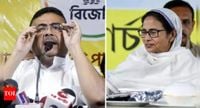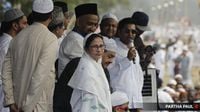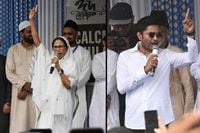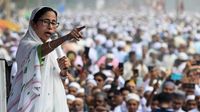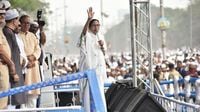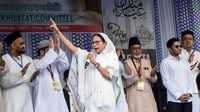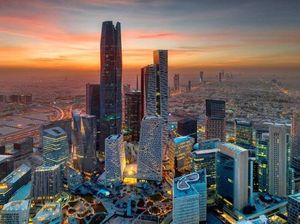West Bengal Chief Minister Mamata Banerjee recently addressed an Eid gathering at Red Road in Kolkata, urging citizens to resist provocations that could lead to communal violence. Her remarks come in the wake of heightened tensions in the state, particularly following clashes in Malda district that resulted in internet shutdowns and prohibitory orders.
On March 31, 2025, Banerjee emphasized her commitment to social harmony and criticized the Bharatiya Janata Party (BJP) for what she termed "divisive politics." She referred to the BJP's approach as "ganda dharam" (dirty religion), stating, "I follow the religion followed by Shri Ramakrishna Paramahansa and Swami Vivekananda. I don’t follow the ganda dharam made by the ‘jumla party (BJP), they are even against the Hindu dharam." This statement sparked backlash from BJP leaders, who accused her of disrespecting Hinduism.
In her speech, Banerjee reassured the Muslim community, saying, "If they tell you something, remember that Didi stands with you... the entire government is with you. Do not believe they can do anything to you." She implored attendees not to engage with efforts aimed at inciting violence, reinforcing her government's stance against communal strife.
Her comments came just days after violent incidents in Malda, where clashes between communities led to significant unrest. Following these events, a senior police official had warned against the spread of rumors and incitement on social media, urging citizens to remain calm during the celebrations of Eid and Ram Navami.
BJP leader and West Bengal's Leader of the Opposition, Suvendu Adhikari, responded sharply to Banerjee's remarks, questioning her choice of words. He posted on social media, "Which religion were you specifically referring to? Sanatan Hindu Dharma? What kind of provocative speech did you deliver... on the occasion of Eid-ul-Fitr?" Adhikari accused her of weaponizing religion and stirring communal tensions.
Additionally, BJP's IT cell chief Amit Malviya criticized Banerjee, stating, "Is Sanatan Dharma a ‘Ganda Dharm’ for West Bengal Chief Minister Mamata Banerjee? Despite numerous anti-Hindu riots under her watch, she has the audacity to mock Hindus and deride their faith." This sentiment was echoed by other party leaders who claimed that Banerjee's remarks were a direct affront to Hindu beliefs.
In response to the backlash, Trinamool Congress (TMC) officials defended Banerjee, asserting that her comments were misrepresented. TMC state vice president Jaiprakash Majumdar stated, "She never said anything against the Hindu religion but was vocal against the communal politics of the BJP." He further emphasized that the chief minister's commitment to secularism is unwavering.
Banerjee's remarks at the Eid event also included a broader critique of political alliances, specifically targeting the Left party's perceived collaboration with the BJP. She stated, "The Left that used to talk of secularism has joined forces with the saffron party. Rest assured, I will stand my ground, I am equal to a hundred people." This comment highlights her belief in the importance of standing firm against what she views as a threat to communal harmony.
In her address, Banerjee also reflected on her identity as an Indian, saying, "I am Hindu, I am Muslim, I am Sikh, I am Christian, I am Indian. What can you do?" This declaration was met with applause from the crowd, reinforcing her message of unity among diverse religious communities.
Despite the ongoing tensions, Banerjee assured attendees that her government would protect all citizens, stating, "If they (BJP) want to divide the country, we must first protect the Constitution. What does the Constitution say? That we are secular. If they want to divide us, they have to change the Constitution first." This assertion underscores her commitment to maintaining West Bengal's pluralistic ethos amid rising communal conflicts.
As the political rhetoric intensifies, the upcoming Ram Navami celebrations, scheduled for April 6, 2025, loom large on the horizon. Concerns about potential unrest during these festivities remain high, especially given recent reports of arson and violence in Malda and Murshidabad. The BJP has been actively mobilizing its base for these celebrations, further complicating the already charged atmosphere.
In light of these developments, Banerjee's Eid address serves as both a reassurance to her supporters and a challenge to her opponents. Her insistence on unity and her rejection of divisive politics resonate with many in a state where communal tensions have historically flared up. As the political landscape continues to evolve, the implications of her statements will likely play a crucial role in shaping the discourse around communal relations in West Bengal.
Ultimately, the situation remains fluid, with both the TMC and BJP gearing up for what promises to be a contentious political battle in the lead-up to the upcoming elections. With communal harmony at stake, the actions and rhetoric of both parties will be closely scrutinized by the public and political analysts alike.
